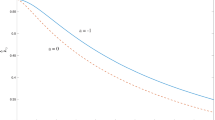Abstract
In the first part a system of equations for an inductive charged relativistic fluid with finite conductivity is written in a space time with given metric, taking into account thermodynamic phenomena. Speeds of propagation of various types of waves are determined under a restrictive hypothesis concerning the heat currentq: thatq depends only on the thermodynamical quantities and the gradient of one function of these quantities.
In the second part it is shown, by a detailed study of the characteristic polynomial and of its irreducible factors, that, whenq is negligible, the proposed system is non-strictly hyperbolic in the sense ofJ. Leray andY. Ohya and existence and uniqueness theorems of a certain Gevrey class are verified; the relativistic causality principle is satisfied under some physically reasonable assumptions on the thermodynamical quantities. The system becomes strictly hyperbolic (existence and uniqueness theorems obtain in classes of functions with a finite number of derivatives) when the fluid is both non inductive and of zero electrical conductivity.
In the third part we show briefly, by the methods of the second part, that the equations of relativistic fluids, with an infinite electrical conductivity is also non-strictly hyperbolic. The linearized equations (in the neighborhood of constant values) are strictly hyperbolic.
Similar content being viewed by others
Bibliographie
Abraham, M.: R.C. Circ. Mat. Palermo28, 27–35 (1909).
Pham Mau Quan: J. Rat. Mech. An.5, 473–538 (1956).
Bruhat, Y.: Acta Astronautica6, 354–365 (1960).
Latremoliere, C.: Diplôme d'Etudes Supérieures. Paris 1960.
Pichon, G.: Ann. Inst. Poincaré2, 21–85 (1965).
Pham Mau Quan: C.R. Acad. Sci.261, 3049–3051 (1965).
Bruhat, Y., andPham Mau Quan: C.R. Acad. Sci.261, 3987–3990 (1965).
Leray, J., etY. Ohya: Colloque Analyse Fonctionnelle. Liège 1964.
—— Math. Ann.162, 228–236 (1966).
Bruhat, Y.: Bull. Soc. Math.86, 155–175 (1958).
Lichnerowicz, A.: C.R. Acad. Sci.260, 329–334 (1965); Commun. Math. Phys.1, 328–373 (1966).
Taub, A. H.: Phys. Rev.74, 328–334 (1948).
—— Arch. Rat. Mech. An.3, 312–324 (1959).
Lichnerowicz, A.: C.R. Acad. Sci.260, 4449–4453 (1965); Cours Collège de France 1965/66.
Landau-Lifshitz, L.: Course of theoretical Physics. New York: Pergamon 1960.
Lichnerowicz, A.: Théories relativistes de la gravitation et de l'électromagnetisme. Paris: Masson 1955.
Coburn, N.: J. Math. Mech.10, 361–391 (1961).
Eckart, E.: Phys. Rev.58, 919–924 (1940).
Bruhat, G.: Cours d'électricité, éd. revue parG. Goudet. Paris: Masson 1961.
Leray, J.: Hyperbolic differential equations. Princeton: Inst. for Adr. Study 1951/52 (Notes miméographiées).
Bruhat, Y.: J. math. pures appl. (à paraître 1966).
Author information
Authors and Affiliations
Rights and permissions
About this article
Cite this article
Bruhat, Y. Etude des Equations des Fluides Chargés Relativistes Inductifs et Conducteurs. Commun.Math. Phys. 3, 334–357 (1966). https://doi.org/10.1007/BF01645087
Received:
Issue Date:
DOI: https://doi.org/10.1007/BF01645087



